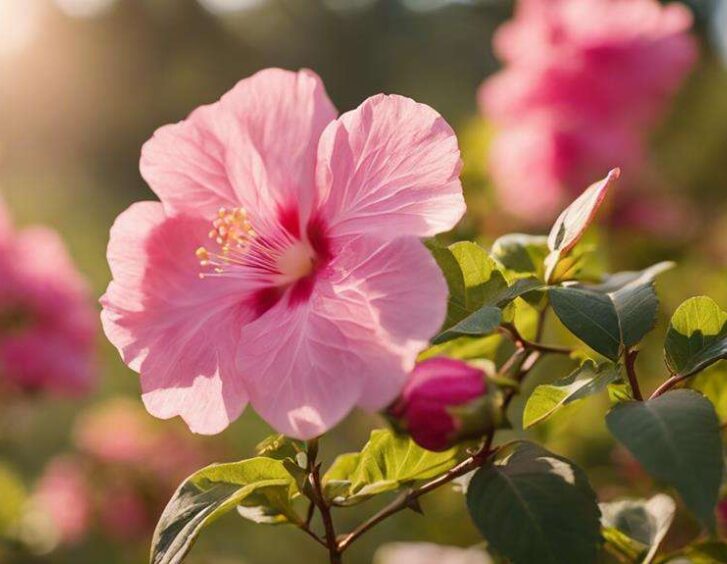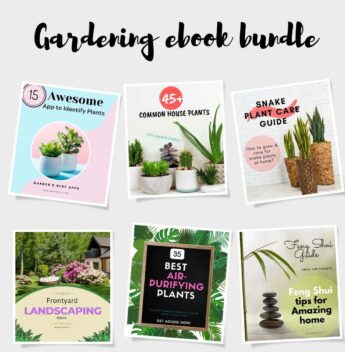To help your Rose of Sharon thrive and show off its vibrant, trumpet-shaped blooms, it's essential to give it the right care and conditions.
Start by finding a sunny to partially shaded spot with well-draining soil that has a slightly acidic pH level. When planting, make sure to space them out about 3-5 feet apart to allow for proper growth.
Enhance the soil by mixing in some organic matter like compost or well-rotted manure to provide nutrients for your shrub.
Remember to water it regularly and prune it seasonally to maintain its health and beauty.
By following these steps, you'll soon be able to enjoy the stunning display of your Rose of Sharon in full bloom.
Explore more tips and tricks to ensure your shrub thrives in your garden!
Key Takeaways
• Plant Rose of Sharon in well-draining soil with slightly acidic pH and full sun to partial shade for optimal growth.
• Prune seasonally to maintain shape, encourage new growth, and promote healthy development.
• Water regularly, especially during the first growing season, but avoid overwatering to prevent fungal diseases.
• Take cuttings from a mature plant in midsummer, using rooting hormone and a well-draining medium for successful propagation.
• Inspect regularly for pests like aphids, Japanese beetles, or whiteflies, and maintain good air circulation to prevent infestations.
Plant Overview and Characteristics
Native to East Asia, particularly China, the Rose of Sharon is a deciduous flowering shrub belonging to the Malvaceae family and genus Hibiscus syriacus, boasting trumpet-shaped flowers in a vibrant array of colors.
As you prepare to grow this stunning shrub, you'll want to make sure that it thrives in well-draining soil with a slightly acidic pH. To keep your Rose of Sharon healthy, perform seasonal pruning to maintain its shape and encourage new growth.
You'll also want to confirm that your soil is rich in organic matter, as this will support the shrub's robust growth. By meeting these basic needs, you'll be rewarded with a vibrant display of flowers that will brighten up your garden.
Best Planting Practices
When deciding where to plant your Rose of Sharon, choose a location that receives full sun to partial shade, as this flowering shrub thrives in areas with at least six hours of direct sunlight. For best growth, prepare the soil by loosening it to a depth of 12-18 inches and mixing in organic matter like compost or well-rotted manure.
Water your Rose of Sharon regularly, especially during its first growing season, but avoid overwatering, which can lead to root rot. Plant your shrub at a spacing of 3-5 feet apart to allow for proper air circulation and sunlight penetration.
With proper soil preparation, watering, and sunlight, your Rose of Sharon will thrive and provide beautiful blooms for years to come.
Propagation Made Easy
By taking cuttings from a mature Rose of Sharon, you can easily propagate a new shrub that will thrive in your garden. Midsummer is the best time for taking cuttings, as the stems are more likely to root successfully.
Take 4-6 inch stems, remove lower leaves, and optionally use a rooting hormone for woody stems. Plant the cuttings in well-draining medium like sand, and cover with a plastic bag for a week.
Make sure the plant takes up water and nutrients for robust winter survival. With these simple rooting techniques, you'll be on your way to successful cuttings.
Popular Varieties to Consider
You can choose from a variety of Rose of Sharon cultivars, each boasting unique characteristics, such as different flower colors and forms, like the popular Blue Chiffon and Minerva varieties. These varieties offer a range of colorful blooms to enhance your garden design.
Blue Chiffon, for instance, features delicate, sky-blue flowers, while Minerva boasts vibrant purple blooms. You can select varieties that complement your garden's color scheme and style. Consider the mature size, growth rate, and hardiness zone when selecting the perfect variety for your garden.
With so many options available, you're sure to find the perfect Rose of Sharon to add a touch of elegance and beauty to your outdoor space.
Common Problems to Watch
Like many plants, your Rose of Sharon can fall prey to pests and diseases if you don't keep a watchful eye out for common issues. To prevent infestations, regularly inspect your plant for signs of aphids, Japanese beetles, or whiteflies. For prevention techniques, maintain good air circulation, water carefully, and remove weeds that can harbor pests.
If you do notice problems, troubleshooting methods include spraying soapy water or neem oil to control pests. Fungal diseases can be prevented by avoiding overwatering and ensuring good drainage.
Companion Plants for Success
When choosing companion plants for your Rose of Sharon, select varieties that complement its growth habits and provide a visually appealing contrast. You'll want plants that thrive in similar conditions, like full sun to partial shade and well-draining soil.
Consider Hydrangea pairings, which add a lovely contrast in texture and color.
For a lush, layered look, try pairing your Rose of Sharon with Hosta combinations. These low-maintenance plants come in a range of sizes and colors, making them an excellent choice for filling in gaps and adding depth to your garden.
Essential Care and Maintenance
Maintaining your Rose of Sharon's health requires regular watering, fertilization, and pruning to promote robust growth and encourage blooming.
You'll want to provide about an inch of water per week, either from rain or irrigation. Fertilize your shrub in the spring with a balanced fertilizer to support new growth.
Pruning techniques are vital to maintain shape and encourage blooming. Remove dead or damaged branches, and cut back stems to encourage new growth.
Soil requirements include well-draining soil with a pH between 6.0 and 7.0. You can test your soil to determine its pH level and amend it if necessary.
Protecting Your Rose of Sharon
Having successfully established a thriving Rose of Sharon through proper care and maintenance, now it's time to focus on shielding it from potential threats that could compromise its health and beauty.
To guarantee your plant remains healthy and resilient, consider the following protection measures:
- Winter protection: Mulch around the base to insulate the roots and prevent damage from freezing temperatures.
- Pest prevention: Regularly inspect your plant for signs of pests like aphids and Japanese beetles, and take action promptly to prevent infestations.
- Disease prevention: Avoid overwatering, which can lead to fungal diseases, and ensure good air circulation around your plant.
Growing Conditions and Tips
To flourish, your Rose of Sharon needs full sun to partial shade and well-draining soil with a pH between 6.0 and 7.0, making it a great addition to gardens with diverse conditions.
You'll want to guarantee the soil drains well to prevent waterlogged soil, which can lead to root rot. Water your Rose of Sharon regularly, but avoid overwatering, which can be detrimental to its health.
Prune your plant in late winter or early spring to maintain its shape and promote healthy growth. Provide at least six hours of direct sunlight per day, as it loves basking in the sun.
The Beauty of Rose of Sharon
With its vibrant colors and delicate, trumpet-shaped blooms, your Rose of Sharon is sure to be a stunning centerpiece in your garden. This beautiful shrub adds a touch of elegance and charm to any outdoor space, making it perfect for creating summer memories with family and friends.
Here are three reasons why Rose of Sharon is a great addition to your garden:
- Colorful blooms: Rose of Sharon produces an abundance of colorful flowers in shades of pink, purple, blue, and white, adding a pop of color to your garden.
- Garden charm: Its delicate blooms and slender stems create a sense of whimsy and romance, making your garden feel like a serene oasis.
- Floral elegance: Rose of Sharon's elegant flowers and slender leaves add a touch of sophistication to your garden, making it perfect for outdoor gatherings and events.
Frequently Asked Questions
Can Rose of Sharon Be Grown in Containers?
You're wondering if you can grow rose of Sharon in containers? Absolutely! Choose a large container with good drainage and a potting mix that's well-draining too. Aim for a soil depth of at least 12-18 inches to accommodate the roots.
Make sure your container gets full sun to partial shade, and water regularly. With proper care, your rose of Sharon will thrive in its container home.
Is Rose of Sharon Deer-Resistant or Attractive to Deer?
You're wondering if deer find Rose of Sharon attractive or if it's deer-resistant. Unfortunately, deer do feed on Rose of Sharon, especially in the winter when other food sources are scarce.
To deter them, try using deer deterrent methods like fencing, repellents, or planting deer-resistant companion plants.
Understanding deer feeding habits can help you protect your Rose of Sharon; for instance, deer tend to avoid plants with strong scents or bitter tastes.
Can I Grow Rose of Sharon as a Bonsai or Topiary?
You can grow Rose of Sharon as a bonsai or topiary, but it requires careful pruning techniques and training methods.
Since Rose of Sharon has a natural shrub-like shape, you'll need to prune it regularly to maintain the desired form. Use clean cuts, and remove any weak or dead branches.
Train the plant by gently bending and securing the stems to create the desired shape.
With patience and consistent pruning, you can create a beautiful, unique Rose of Sharon bonsai or topiary.
Is Rose of Sharon Toxic to Bees or Other Pollinators?
As you plant and nurture your Rose of Sharon, you might wonder: is it toxic to bees or other pollinators? Rest assured, Rose of Sharon isn't harmful to bees or other pollinators.
In fact, its nectar-rich flowers support pollinator health, contributing to a thriving ecosystem. By growing this plant, you're supporting insect allies and helping combat pollinator decline.
Can Rose of Sharon Be Used as a Natural Fence or Screen?
You're wondering if you can use Rose of Sharon as a natural fence or screen. The answer is yes! With its ability to grow up to 12 feet tall, it can serve as a beautiful boundary marker or hedge alternative.
Simply plant multiple shrubs close together, and they'll form a stunning, flowering barrier. Just be mindful of its potential to self-seed and become invasive in some regions.
















